Ocate Cliffs Blog
Note that history prior to Summer 2019 is found on the History page.
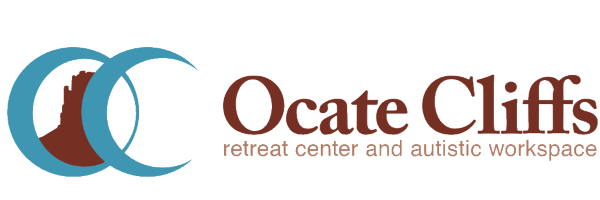
Note that history prior to Summer 2019 is found on the History page.
Hello everyone,
Activities this summer
We had an autistic women’s retreat in August, and for some of us it was grounding and bonding in a way that is so hard to find anywhere else. Just being completely ok being ourselves with the stars shining on us! My top memory is acting like prairie dogs in the game of “psychiatrist”, and of course finding common ground among our very different life experiences.
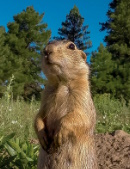
A documentary is being made about this and other autistic women’s experiences; meanwhile you can see the inspiring cliff views here:
In September an autistic child and his mom stayed the whole month for a grounding homeschool-retreat, experiencing the freedom to grow into his strengths without attempts to coerce him into “normalcy”.
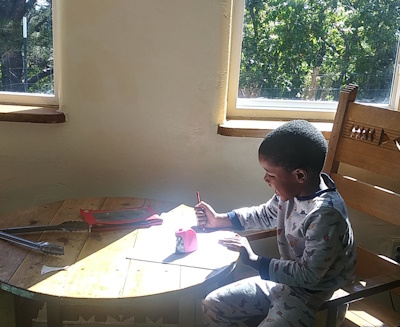
Closing up
Despite the power in what we have done so far, this will be our last newsletter. We have been unable to find someone who can continue to run Ocate Cliffs, which has been a longstanding need. Additionally, due to the nature of nonprofit organizations being dependent on volunteers, we simply do not have enough hands available to keep ourselves afloat. Divergent Labs will not be closing up for now but running minimally, in case someone wants to come along and revive it.
Plans are in place to sell the land, property, and equipment associated with Ocate Cliffs.
We are sorry this is what it has come to, as Ocate Cliffs has had such a long and successful history in supporting autistic people. However, shutting it down allows more time for our program manager and volunteers- all wonderful autistic advocates- to work on their own projects.
If you are in need of local NM autistic resources, please check out Wilderwood Equine Therapy and Rescue https://wilderwoodequinetherapy.org/
or NM Autism Society’s page of resources: https://nmautismsociety.org/resources . Unfortunately New Mexico still has a need for autistic adult groups so this list is short – if you have any suggestions please let us know!
We appreciate your support and staying up-to-date. Please feel free to contact us via email, Facebook, or Instagram if you have any comments.
Thank you,
Jeanie Vo, Board Member
&
Star Ford, Program Manager
| Hello everyone, I hope you have been staying cool in the summer heat! Remember to drink water and give yourself time to rest. HAUTISM: Hautism is an immersive retreat program for autistic women developed by Wilderwood Equine Therapy and Rescue. The upcoming session in late August will feature 6 presenters and a large variety of presentation topics. There will also be some filming done for Wilderwood’s documentary project about the experiences of autistic women. This documentary will likely come out sometime next year. It is possible we will run future Hautism sessions at Ocate Cliffs. OCATE CLIFFS: The state of Ocate Cliffs is currently in an uncertain transition period; we are considering changing the types of programs held at OC and the audiences we will serve. Due to the nature of nonprofit organizations being dependent on volunteers, we simply do not have enough hands available to keep ourselves afloat in our organizational model. More specifically, OC has been in a niche that is difficult to serve. We do not provide structured job training or “services” for disabled people. It is also not just a vacation place. Over time, we have had a variety of people involved in this project with various levels of complexity and goals. Some may find it hard for the system to serve them in any way, but don’t have the independence and privilege to advance in their lives otherwise. So, OC could serve as a last resort for some people who haven’t been able to figure out what else to do. This population group generally is unable to financially fund OC (which we have no problem with, but OC cannot be supported this way). They may additionally not be self-sufficient enough to help run the program, so they can’t be neatly on either side of the provider/consumer divide that our social services system is built on. There may be no model where OC can get funds to help those complex people in that middle ground, yet there are a lot of people in that category who need a way forward. That being said, we will do our best to keep Ocate Cliffs up and running for now, despite these difficulties. We appreciate your support and staying up-to-date. If you could share your thoughts, or spread our resource to people or other organizations you know, that would be appreciated! Also follow our Facebook page and Instagram at http://facebook.com/ocatecliffs and https://instagram.com/ocatecliffs – it really helps us get better well-known so we may continue programs at Ocate Cliffs! Stay tuned, Jeanie Vo, Board Member & Star Ford, Program Manager |
Hello all, I hope you have been enjoying spring!
Ocate Cliffs is open for visiting starting in May, which could be free in exchange for volunteering with us. We can use volunteers for maintaining the house and trails. If interested, please contact Star at star@divergentlabs.org.
Currently, our Hipcamp and Airbnb listings are not open but arrangements can be made if anyone is interested in renting the house. For an overview of what the house and location offers, see here: Airbnb listing – https://www.airbnb.com/rooms/43485702?guests=1&adults=1&s=67&unique_share_id=d936f8ce-deb7-46b3-afca-4e1758f7b067
Mike, our friend from New Hampshire, stayed at Ocate Cliffs over winter. He reported that stocking up on food and heating with wood went well, but he did feel lonely at times. It can get lonesome living somewhere so far away from others. Regardless, thank you Mike for looking over the place during the winter and we hope to see you again.
Later this month we will have road work done so traveling up and down the mountain will be much easier. This is great for making the transportation more accessible to standard vehicles. We can expect future travels to the top of Ocate Cliffs to be much less rocky.
Don’t forget to check out our Hautism/women+ program at Ocate Cliffs in the summer! It is a one-week retreat for autistic women, transgender, and non-binary participants. Please let others who may be interested know about this opportunity.Webpage and Application: https://wilderwoodequinetherapy.org/hautism/Brochure: https://simplebooklet.com/hautismocateVideo: https://www.youtube.com/watch?v=_lddGmtadX0
And don’t forget to follow and like our Facebook page at http://facebook.com/ocatecliffs – it really helps with getting us more well-known.
Until next time,
Jeanie Vo, Board Member
If someone forwarded you this newsletter, please subscribe at www.ocatecliffs.org.
This page contains three ways to learn about our family camp:
An Experiment in Radical Inclusion
This report was written by Sky, one of the camp staff. Photography is by Sky, LJ, Chris, and Rain.
Ocate Cliffs family camp was an effort to put reframing in action. The pilot program took place over two long weekends in June 2022, bringing a collection of autistic and non autistic families and staff to rural northern New Mexico to connect and frolic in the woods. Creating something for the first time is challenging, but also is an opportunity to rewrite the code of what is expected. At 9,000 feet on top of a forested mesa, where it feels like you could reach up and grab the thunderheads rolling overhead, exposed to the extremes of both sun and rain, and where time itself feels stretched by the space of the sky, is the perfect setting for stretching expectations.
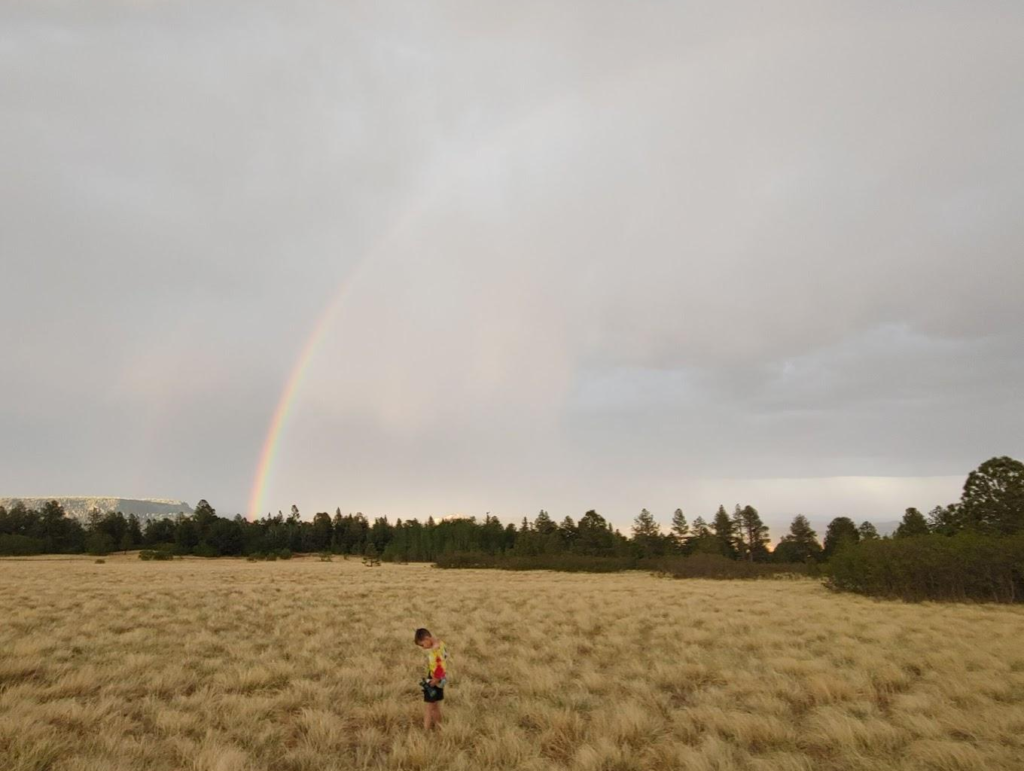
We perceive a need for radically inclusive autistic space, for autistic agency and leadership, and for families with autistic children to learn from autistic adults as well as one another. Radically inclusive means not only accommodating for autistic needs, but also having autistic people as designers of the space and erasing hierarchical boundaries on account of ability and neurotype. There is a lot of information on autism out there. Very little of it comes directly from autistic people. Families new to autism first finding out their child is autistic may be inundated into an overwhelming system of information telling them what therapies the child needs, what special education classes they should be in and how they should practice eye contact with the child, etc. Families need space to connect and find out what actually works. Further, established camps focusing on autism tend to be run largely by allistic (non-autisitic) people and have an ethos of either charity or therapy. In New Mexico, the only other autism program run by autistic people is Wilderwood Equine Therapy and Rescue. Ocate Cliffs family camp was thus an experiment falling into a very broad gap in services. We believe not only can autistic people be leaders and take care of autistic youth, but that doing so is better for autistic people overall, as autistic people often connect to one another at a level others do not. In designing this camp, we aimed to create a radically inclusive autistic space where autistic youth would be completely free to be who they are, to provide a transformative and educational experience for autistic adults, and to make space for parents of autistic youth to share experiences and broaden their own perceptions of autism.
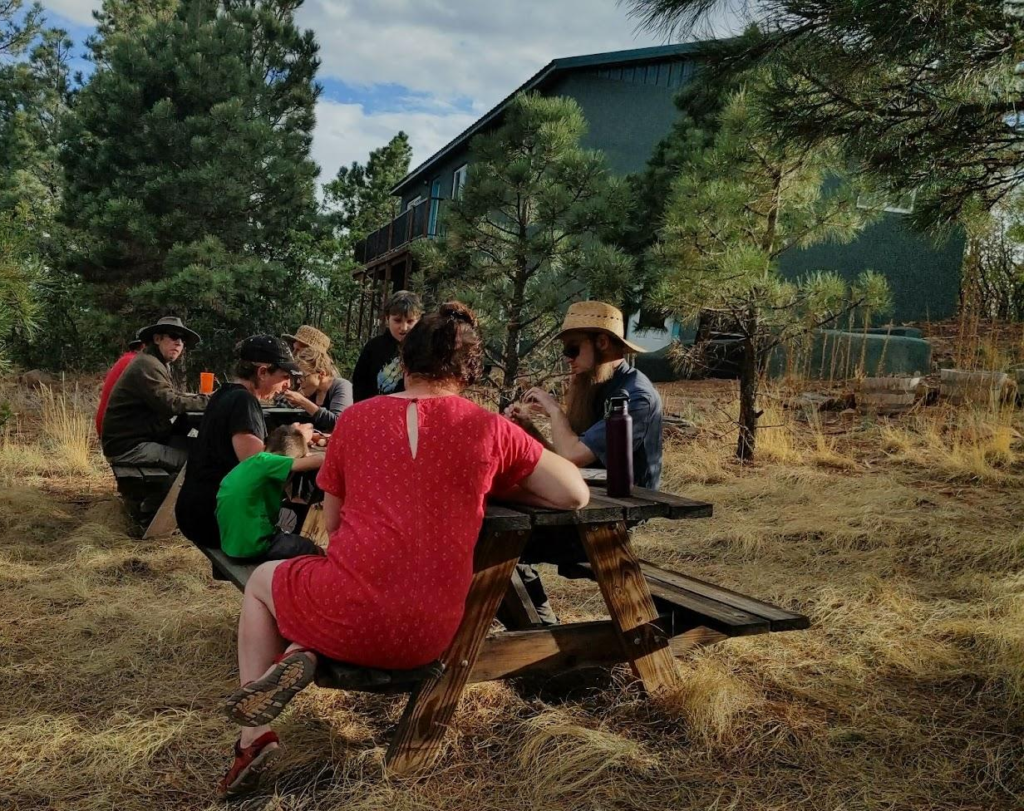

Four families, or 12 people total participated in two long-weekend family camps. The camp was made possible through a grant from NEXT for AUTISM from the proceeds of Color the Spectrum. The grant enabled us to bring participants to the mountain free of charge and give stipends and travel reimbursements to staff. Families came from Santa Fe and Albuquerque and were recruited through word of mouth and support from NMAS (New Mexico Autism Society). In addition to director Star we had five staff of varying backgrounds and ages present. Staff met online in advance of camp to discuss values and goals, and planned the bulk of camp in a planning weekend prior to the first long weekend.
Families participated in a variety of large and small group activities, ranging from outdoor navigation and orienteering to improv skit creation, as well as other games and outdoor skills, hikes, crafts, and discussions. Morning and evening were set as activity blocks with separate parent and youth activities, with a long unstructured break in the middle and optional whole group activities after dinner. What follows is a more in-depth discussion of some elements of the design of the camp and its implementation as related to our goal of creating a radically inclusive space. These fall into the categories of flexibility and structure, age diversity, and autistic leadership.
Creating a supportive space means meeting people where they are. What this meant for us was finding a balance of flexibility and structure, both in terms of day-to-day planning and the ways in which individual participants and staff showed up. We could not predict people’s interests, specific needs, or way of showing up in a group in advance, and as such maintained the ability to be open to in-the-moment adjustments as participants arrived. Within the general outline of meal times, morning and afternoon activity blocks, staff created a broad “menu” of activities which we could choose from and group people depending on interests. In our first weekend with three kids aged 14, 8, and 6, the older two ended up working better together, while the youngest gravitated towards more unstructured nature exploration time, and went on adventures on his own together with two staff. The eldest, C also sometimes chose to join parent discussion groups rather than “kids activity blocks.” The second weekend we had only one large family and they indicated preference for doing more things as a whole group and for less structured time.

The small scale of the camp, the high staff to participant ratio, and the presence of parents allowed us such great flexibility in meeting individual needs. Having participant numbers closer to our target of 6 families per weekend and 6-10 youths might help make groupings more dynamic especially for younger groups. However, small participant numbers didn’t seem to have much negative impact on individual experiences.
Flexibility also applies to the capacity at which staff and participants were able to show up. For many autistic people, a barrier to holding jobs, especially in a field like youth programs, which tends to be very fast paced and exhausting, is coping with sensory overload, overwhelm, and the constant demand for specific kinds of social external energy. A radically inclusive work environment would celebrate what each person contributes and challenge growth while allowing everyone equal access to meeting their own specific needs. Autistic people often cannot put their own needs on hold for the sake of a group. Whereas in typical workplaces, staff are generally expected to ignore interpersonal conflict and personal needs (or work it on their own) and maintain professional appearances, we found it essential to have conflict resolution and emotional check-ins as part of daily working structure. Some staff had no experience in youth programs or little traditional work experience in general but still contributed a lot. Having higher needs as staff need not be a barrier if the workplace is designed for it, such as with higher staff numbers, frequent breaks, and attention to interpersonal and emotional dynamics.
One staffer, Rain, had experience with working with natural materials to build structures. He led a group in collecting same-sized logs, cutting them, and lashing them together to make a durable enclosure. Participants of all ages learned some new knots, learned to use tools,
and planned the overall shape as a team. Another staffer, Jon, also works as a therapist and shared models for person-centered discussion and non-hierarchical facilitation to use with staff and in parent discussions. Prior to participant arrival, staff collaborated to design an orienteering course and construct a multi-step low-ropes course in the woods, which was a big hit for campers. Ocate Cliffs is a place that invites visitors, staff or otherwise, to try new things without having to already be good at them, to propose new projects, and leave a mark on the place in their own unique way. As a staff with significant experience in education and traditional camps, I have frequently run into the challenge of burnout from physical and social energy demands. The lack of pressure to perform and the deeper level of inclusivity at Ocate Cliffs was refreshing. Camp director Star reflected that, “Other non-autistic camps and retreats that I’ve staffed at have had staff that is more self-assured, more jovial, and more able to to keep their personal issues separate from the group. Those things make it easier, but also they tend to be more competitive and my opinions or any neurodivergent input have been pushed aside.”

An important element of the camp was the presence of multiple generations together in one space, activities meant not only for supporting youth but also educating parents, and a lack of rigid age-based distinctions. It is typical in autism services for autistic people to be held up to “developmental milestones” of skills normal to have at certain ages. We intentionally avoided making assumptions on what kids would be like based on age, or assuming older people would know more than younger people. Age tends to be less of a social determinant for autistic people in general, and thus it is natural for connections to occur across groups of broad age ranges.
It was important to have “family time” in the schedule as we lacked resources to run a youth sleepaway camp. It was also important to us to ensure time with parents and their children separated. We wanted to ensure kids had a chance to explore and express themselves away from the expectations and gaze of parents, as an experience common among autistic children is being infantilized and oversteered. It was good to see kids of all families present have a high degree of agency. For instance, both mom and youngest camper L were at first unwilling to separate, but soon he was leading staff on off-trail explorations. Another notable moment was hearing comments from siblings and parents of an autistic youngest sibling about his lack of ability (to play a game independently or solve a puzzle), in a way that suggested those types of comments were common. When he later demonstrated he was able to do those things he received positive validation from his family.
In addition to giving kids opportunities to explore independently, one goal of the camp was to give parents space away from their children to openly discuss their experiences, what has worked in their families and what challenges they’ve encountered. In semi-guided discussions with staff, parents discussed experiences in education, school bullying, neurodivergence and their own experiences growing up. There was a broad range of perspectives on autism even in that small group and the discussions gave space for sharing both shared and diverging experiences.
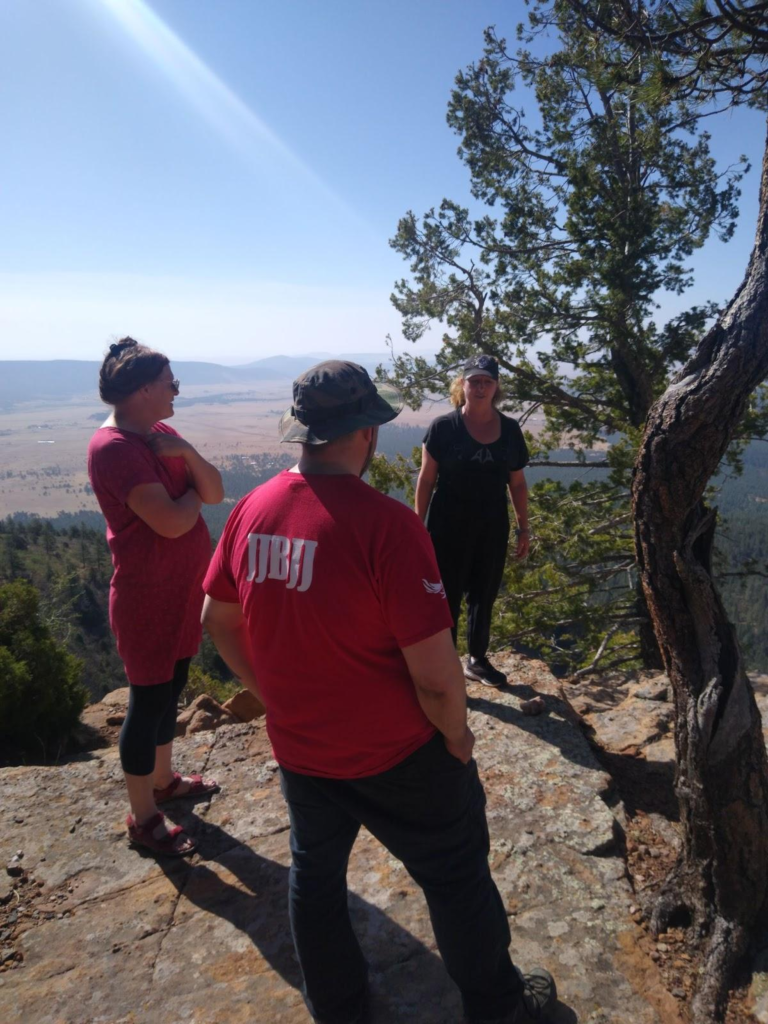
It was critical for us to have autistic staff as leaders in creating autistic space, as models of adult autistic experiences, and because autistic adults are more likely to relate to the experience of being an autistic child. At the same time, we did not distinguish between autistic and allistic in terms of role, rank, or level of participation, which is the typical pattern for autism organizations. NMAS, for instance, has a by-default allistic board as well as an autistic “advisory board.” The camp was marketed towards families with at least one autistic child. Unsurprisingly, some adult family members were also autistic. All staff were autistic, though this was not a requirement to apply. In fact, at no point did we ask people about their disability or diagnosis status, or ask parents about the disability status of their kids, instead we only asked about needs and accommodations. Camp director Star reflected on the practice of meeting everyone where they are at and deprioritizing diagnosis labels, saying,“a disability isn’t an inherent quality of a person… It’s the accessibility to everything around us that makes the disability matter. If we create an environment that is accessible on all levels, the difference between disabled and non-disabled becomes very minimal.”
Many autism services for youth aim to model “normal” or “developmentally appropriate” behavior. We instead model adult autistic experiences to both youth and parents, thereby creating a shared understanding that it is okay to have autistic traits (visible or not visible) and that autistic people can grow up to have fulfilling lives. This “modeling” is not explicit, but rather an implicit culture created through the presence of autistic staff and the broad range of ways autism shows up, organic conversations and connections, and lack of structural hierarchies. Autistic people often connect with one another at a level that allistic people do not, so what may appear to be a lack of communication from an allistic perspective is actually just a communication style they are unfamiliar with. It should thus be intuitive and much more commonplace to have autistic people involved in supporting one another, and autistic adults supporting autistic youth.This applies to the full spectrum of autistic people, including those who are nonverbal and selectively verbal, and those with high support needs. Several parents noted how well staff worked with their kids, who had struggled or been ostracized at school and other camps. One kid, R, said that it was great to be “with other people who are full-on autistic,” and while we don’t have first-hand or verbal testimonies from all kids, seeing them not want to leave was indicative of a positive experience and feeling truly included.

“Autistic space” happens when the autistic way of being is the norm, when autistic people are not only accommodated but are also themselves the creators of culture in that space. Non-autistic people can be part of autistic space. In fact, having more non-autistics understand autistic space and integrating components of autistic space into the broader world is more fully inclusive than having a generally non-accomodating world with autistic-only bubbles. For us, autistic space showed up in openly communicating about needs, in impromptu dances and improv drum circles, and the rhythm established by staff during planning continuing when others arrived. Staff Jon reflected, “It felt a bit strange funnily enough, being around people who pretty much accepted me and one another for whomever they are.” The strangeness speaks to how rare complete inclusion is, how right it feels when you find pockets of it.

By far the greatest barrier for us was outreach and recruitment. Both hiring staff and recruiting participants turned out to be more challenging than expected. None of the initial targets in our grant proposal of 6-10 autistic adult staff, 10-12 autistic children, and 8-12 parents and other family members were met. On the staff side, this is not that surprising as youth programs and camps across the board are having difficulty hiring at full capacity. We relied mostly on interpersonal connections (people who already knew about Ocate Cliffs) and local advertisement to recruit staff. Of those who showed up, a majority were already involved with Ocate Cliffs.
We recruited participants through email outreach with help from NMAS, through word of mouth, and through leafleting at an Albuquerque autism event. Recruitment challenges for participants can be partly explained by the remote location of the camp and condensed timeline for recruitment (grant approved in March, recruitment started in April for June camp). Additionally, running this camp for the first time we lacked a reputation and a returning staff and participant base. Because of this lack of reputation and it being free of charge, it may have not seemed like something that required serious commitment. A lot of people who expressed interest did not show up, including several last-minute cancellations. The four families who did come found out about camp through word of mouth (knowing a staff member) and through person to person contact from leafleting.
Anonymity and lack of social rank, and therefore access to broad support bases and networks that signify cultural legitimacy, are a challenge for many autistic people and autistic-led organizations. Autistic people tend to have small social networks and struggle with networking, and along with that, marketing in a way that taps into cultural codes of popularity and hype. Autistic-led autism organizations are in general much less well-funded and well known than mainstream counterparts, both because of autistic traits that make unifying and marketing difficult, but also because of systemic depowering of autistic people. We do wonder to what extent a tacit culture of downplaying the legitimacy of autistic initiatives played a role in recruitment challenges. People have a different conversational affect when sharing something they genuinely want you to buy into vs. something they feel is theoretically good but perhaps immature, an affect which is especially impactful when coming from a person or institution of power. Outreach support for Ocate Cliffs family camp may have conveyed a tone that we were a cute but unproven autism self-advocacy project rather than a legitimate program which will actually benefit autistic youth.
For Ocate Cliffs to grow and continue to host similar camps, we need connections and partnerships with larger autism organizations. We need a consistent source of funding in order to make this happen again. To reach the people who would most benefit from this kind of service, we need to straddle the divides of mainstream autism services and scattered autistic self-advocacy networks. Those with the greatest need tend to fall into mainstream autism institutions, far from the principles of autistic self-advocacy, while those institutions tend to not be truly inclusive of autistic people wanting to change how things are done.Should this camp (and other similar programs) develop a reputation as a legitimate and consistent program, it has the potential to depower the autism industry’s hold on how autism is framed and how autism support should be done.
In future camps,we aim to begin the outreach process earlier andpartner with people who know how to do networking. While it is important to retain maximum accessibility by being free of charge, we need some assurance of commitment from people who sign up, such as a refundable deposit. We would like to hire more staff to ensure covering all bases and leave space for people to step back if needed. While having a majority-autistic staff and an overall autistic space is a pillar we want to maintain, some non-autistic staff might create balance in terms of having more communication styles represented. We would adjust some program areas as we learn what works best, such as having moments of intentional crossover between parent and youth groups, while maintaining the overall structure of the camp. Specific feedback in how to better accommodate all needs is always welcome.

Despite the small turnout of the camp, the 2022 autistic family camp pilot program at Ocate Cliffs was successful on many accounts. We provided joyful experiences for youth and opportunities for self-expression, practiced autistic leadership, and fostered connections among parents. People walked away having been stirred by the experience, changed at an intangible level. Whether or not we repeat a camp of the exact same model, we hope the guiding structure and philosophy of this program will provide a template for us and other organizations going forwards. We need more autism services that are radically inclusive, and not just modeled as charity or therapy. This looks like autistic design and leadership in implementation, autistic adults serving as models and mentors for autistic youth, and erasure of social hierarchies and divisions in role and rank on account of ability or diagnosis. This also looks like built-in flexibility, meeting people as they are instead of comparing them to a norm or expectation, and work environments that are designed to be accommodating so that having needs is not a barrier to being able to show up. As Star says, “It’s really important to me that a lot more people experience a social environment where disability is minimized because of all the types of accessibility we keep working on that makes it possible for disabled people to operate on the same level, at the same type of power and same type of leadership as others.” This was just one camp over two weeks bringing a couple dozen people together on one mountain in New Mexico, but the intention that went into it was about more than those few days, for it was really just a radical experiment in the way we want everything to be.

Hello all, hope your winter has been well so far.
A wonderful article has been written about us on NextAvenue – check it out! It includes an interview with Star, our Program Manager. https://www.nextavenue.org/making-space-for-autistic-adults/
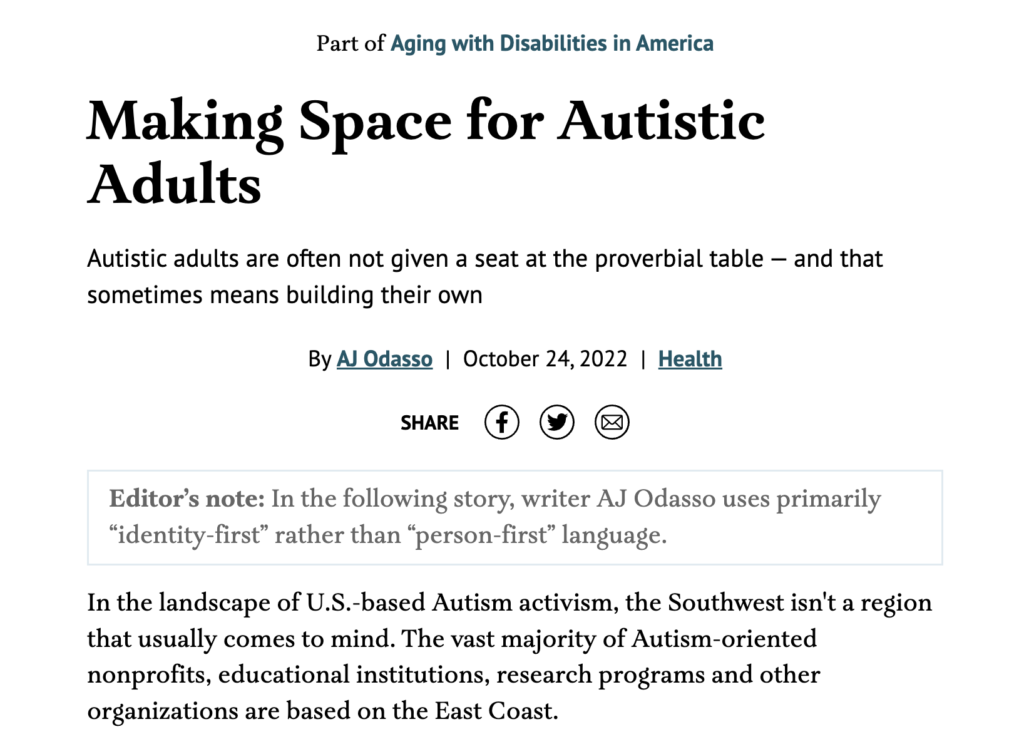
In November, the board of directors tried out a short, over-night version of an autistic retreat filled with hiking, cooking, games, and other bonding activities.
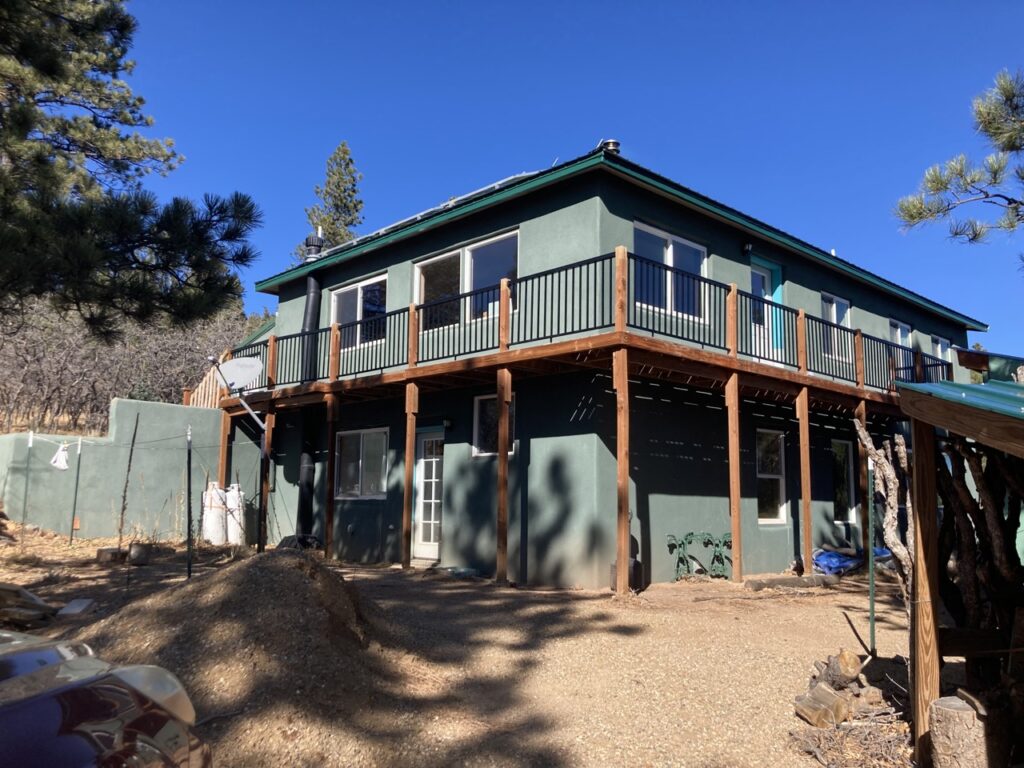
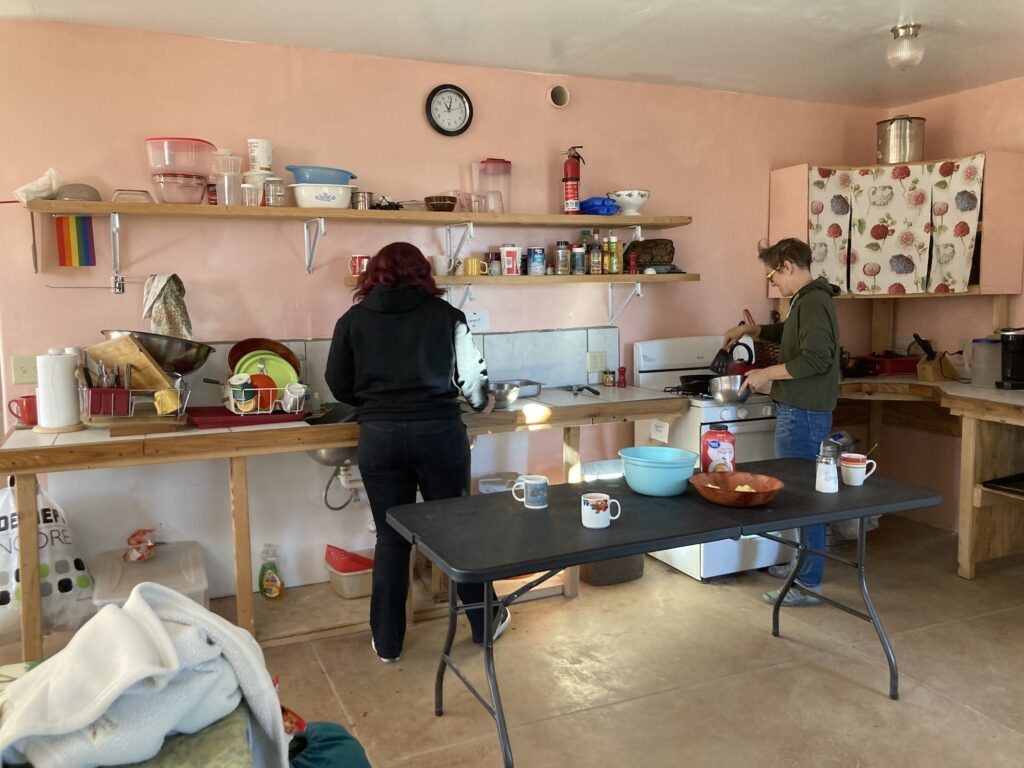
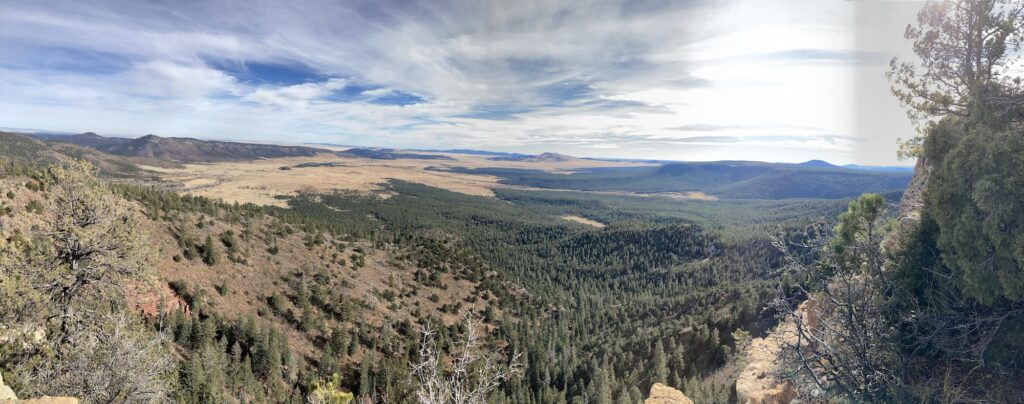
With it being a success, we are proud to announce a collaboration with Wilderwood Equine Therapy and Rescue to host the Hautism/women+ program at Ocate Cliffs in the summer of 2023. It is a one-week retreat for autistic women, transgender, and non-binary participants.
For more information and to apply, please check the links below. Please let others who may be interested know about this opportunity.
Webpage and Application: https://wilderwoodequinetherapy.org/hautism/
Brochure: https://simplebooklet.com/hautismocate
Video: https://www.youtube.com/watch?v=_lddGmtadX0
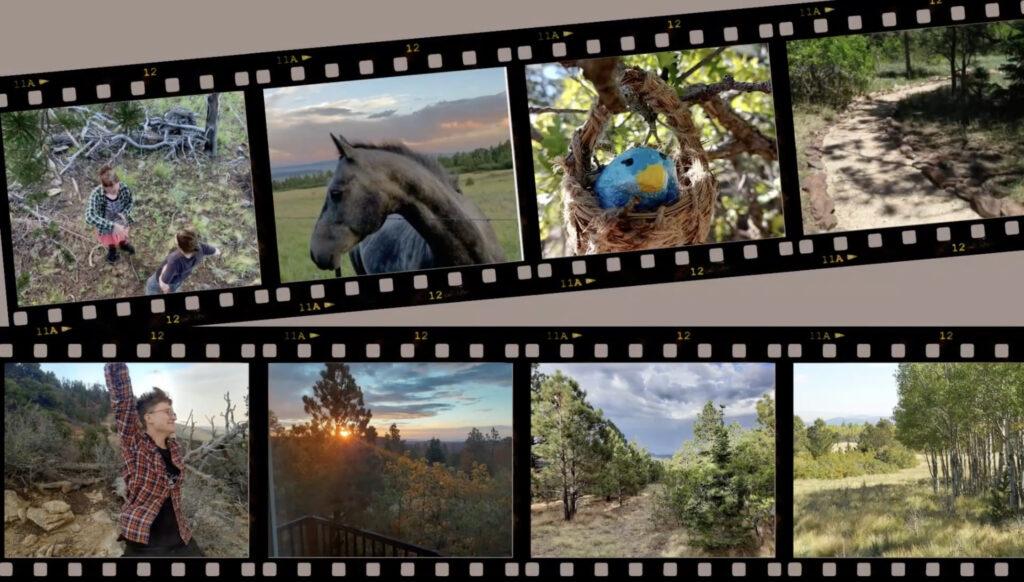
We are also looking for volunteers to help host the retreat. If interested, please contact Star at starluciaford@gmail.com.
Don’t forget to follow our Facebook page at http://facebook.com/ocatecliffs – it really helps with getting us more well-known.
Until next time,
Jeanie Vo, Board Member
We had our first family camp this summer, with an autistic staff and kids with their families. In our quietly radical way, we turned over the usual paradigm of strict lines dividing abled from disabled. One of the most compelling observations for me in support of what we are doing was with a child who was cooperative and fun and often made people smile – but then we found out that he has often been labeled with “behavior problems” even though we never saw that side of him. We didn’t change him; we just made an environment where he could be included and communicate as himself.
Here are a few pictures of that experience.
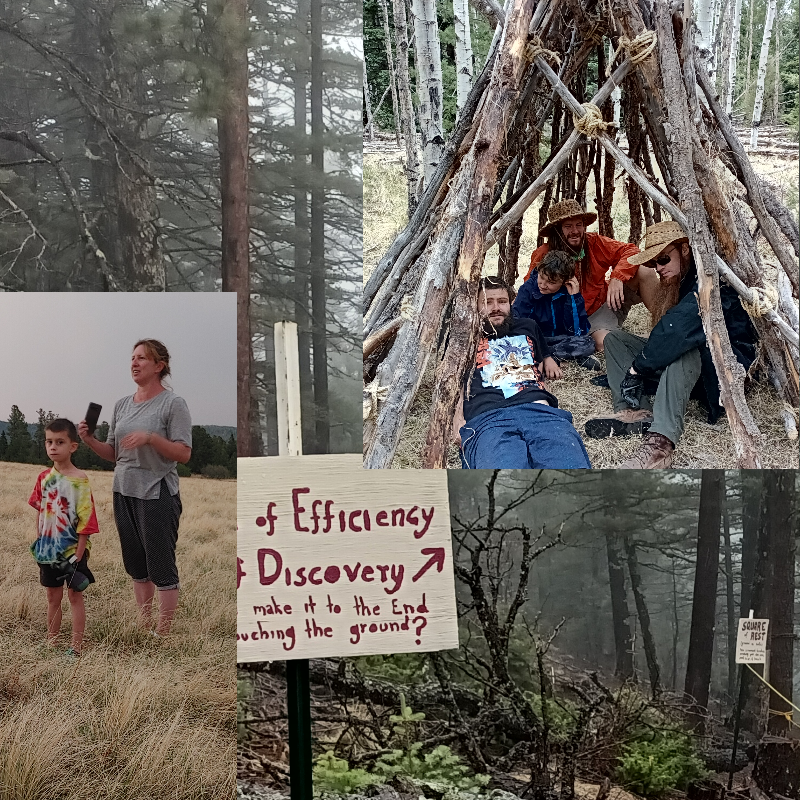
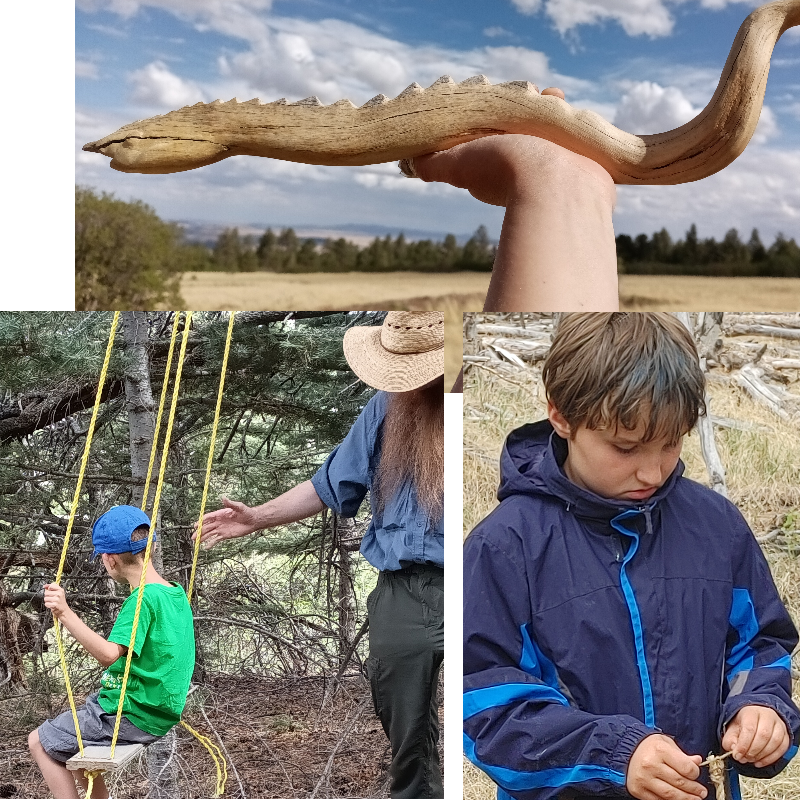
Later in the year we will be releasing report of the camp with video, comics, and text. A big thanks to the staff, some of whom traveled long distances to be here for the month.
In other news, our board of directors has gone through a renewal in the past year. We have six new directors in New Mexico with lots of new energy. Another big thanks to the original board members who kept us going since inception in 2013.
In service,
Star Ford, Program Manager
In June, we’re having two 4-day family camps for autistic kids and their families. It’s an exciting and unusual arrangement because it’s staffed by a range of autistic to non-autistic staff in cooperation as equals, without putting disabled people on a lower tier or in a separate category. My hope is that it opens up useful dialog while being fun and inspiring. More information on that is here:
http://www.divergentlabs.org/ocatecliffs/visit/family-camp-2022/
New Mexico has been suffering from several wildfires around the state as many of you have probably heard. None of them have threatened Ocate Cliffs yet, but it’s an unusally dry year and we need to be extra-careful, as more fires will likely happen through the summer. The fire near Las Vegas has displaced thousands and destroyed many homes. If you want to help with a donation for the area, one foundation has set up a quick way to do that:
https://santa-fe-community-foundation.snwbll.com/community-resiliency-fund
In service,
Star Ford, Program Manager
If someone forwarded you this newsletter, please subscribe at www.ocatecliffs.org.
We received funding to hold a family camp this summer and we’re looking for paid staff. (Maybe you!) Please forward to anyone this might be a fit for.
Outcomes and purposes: Autistic young adults will plan and lead a family wilderness camp for autistic children and their families. There are three important outcome areas. The first is for parents – sharing new ideas for how to work with us and giving the families a way to meet each other for support. They will be able to get insight from autistic adults in areas such as setting up a sensory friendly home or communication techniques.
The second is for staff – giving autistic people the benefits of genuine contribution, gaining experience in working with children with complex needs, and giving us a chance to change the dialog about autism to include us. It also gives those planners a transitional work experience, socializing with peers to combat pervasive isolation, and builds a community that goes far beyond what on-line communities can do.
The third outcome is addressing the polarization and politicization in the autism world through facilitated listening and other techniques from high-tension conflict resolution.
Dates: Not finalized, but plan for about the 2nd half of June.
Pay: The budget is not finalized. but the pay will $500 (possibly more) for helping with the camp, plus some travel assistance, food and lodging. This has been made possible through a grant from NEXT for AUTISM from the proceeds of Color the Spectrum.
Skills needed: Reliability and follow through in tasks, have a genuine interest in the project, willingness to divide up the work and do your part, and ability to de-escalate conflicts by listening to opposing viewpoints. Physical stamina is needed to hike and keep up with active children, and be on call for emergencies. Qualities we will need from at least some of the staff are experience in childcare, experience in autism-specific childcare, and camp/retreat experience (such as cooking and leading games). Additional specialized skills and knowledge can be integrated based on interest of the group. We will also need people who can do video editing and other follow up tasks to publish the experience.
In service,
Star Ford, Program Manager
PS: What about the autistic retreat? The January newsletter mentioned an autreat-like retreat (not the family camp), and I got a reply from a few people about that, but not enough to warrant going forward with planning that kind of event. We can make this happen as soon as we have a definite yes from at least three people.
Greetings. The never-ending pandemic makes it hard to envision a summer of in-person events, but I’m starting to make plans with hopes that it will be safe and allowed (and cancel later if we have to). One thing we’ve never done but I’d like to do in 2022 is an autistic retreat like autreat or autscape, with a structure is around presentations by and for autistic people and with lots of time for meeting people, games, hiking and so on. In the past we’ve been focused on physical work retreats – also fun but different. So if you’re reading this and potentially interested, let me know. Especially let me know if you have physical access needs so that we have time to prepare for that as needed.
If you’d like to come outside of an official retreat time, you can arrange with me too. As with last year, volunteers can stay for free.
We recently got two grants for side projects that are both cross-disability focused. One is a podcast series and the other is a youth art/drama group to take place in Las Vegas (the city nearest Ocate Cliffs). These are just getting started and I hope that they will help us with publicity and networking.
In service,
Star Ford, Program Manager
We sent out a survey – the responses are summarized here, with some editorial at the end.
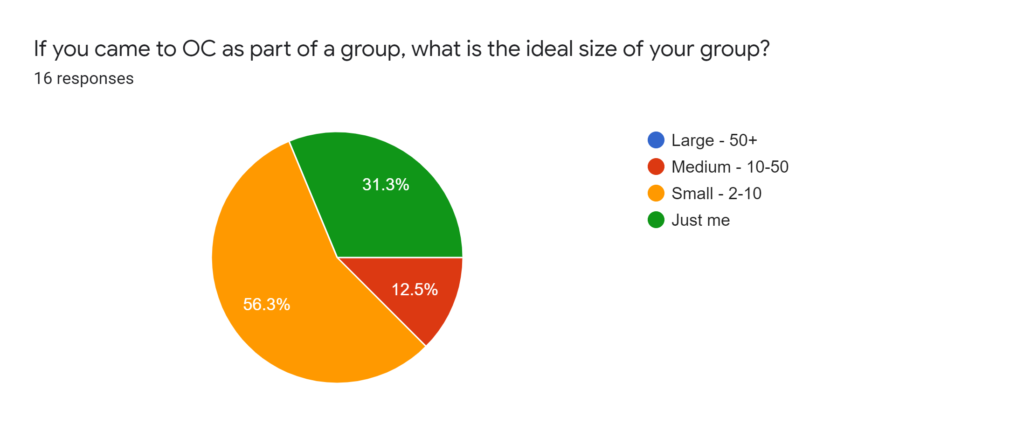
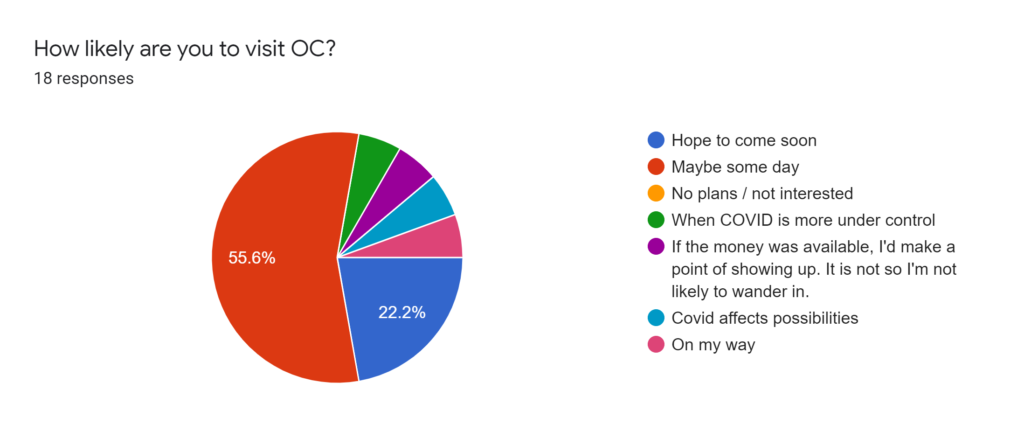
I’ve shortened and categorized the answers above (hopefully without much bias) and here I will add my analysis of what the results mean. Although the sample size is small, the results mirror what we’ve experienced on site so far, and bring to light a few difficult contradictions in our mission and audience.
One (apparent) contradiction is between the need to be with people and make friends or network, and simultaneously a need for alone time or very limited social demands. An observer might say “you can’t have it both ways” or think that a retreat setting is not appropriate for someone who doesn’t want to be around people. But the need to connect with people seems to be about quality over quantity, so the ideal would be a very supportive small group that we get fulfillment from during only a small part of the day, while the rest of the day is on our own.
Another contradiction is the simultaneous need for learning social skills (as needed for jobs) but also being respected for who we are – the competing demands of changing ourselves to “fit in” versus not being required to change. It’s a sore spot in the whole autistic world which sometimes leads to the false dichotomy between “I’m perfect as I am and never need to change” versus “I need to become someone else (or pretend to)”. I’ve looked at this contradiction from the perspective that we all need to grow, whether disabled or not, and we can become our best selves with some work. Our best selves are authentic, and sometime that means being very far from the norm.
A third and related contradiction is between barriers to inclusion and needs for inclusion. There seems to be a pattern that people who are able to get included in things near where they live are not as inclined to try to find an inclusive space far away. OC has been seen as a place of last resort by some who have more barriers than usual, such as health, anxiety, or other things that make involvement in typical volunteer or job settings impossible. This could lead to unrealistic expectations or an imbalance between what someone needs and what they can offer. The culture at large has a solution which is to sort people into givers vs takers, staff vs clients, or donors vs “the needy” – but we don’t want to make that division. Instead, when we first get what we really need, ideally we would then be able to give back – or give forward to the next person who comes.
A fourth contradiction is about financial sustainability – how we make the project self-supporting. The main plan so far has been to charge enough for retreat guests that staff can be paid from that income. In particular it would have to be large groups paying around $1000 per night to reach the scale or self-sufficiency. But some of the answers on the survey suggest that providing that kind of service is opposite to why people would want to come. Some may not be willing or able to do that kind of work even with accommodations, even though those same people energetically support what we are doing. If we tried to get money from the usual disability-related sources like medicaid, it could devolve into a provider/client model, which might pay for it, but could destroy the original concept.
In a more general way, any level of success is a danger. When we find ourselves at the lowest tiers of the social ladder but are able to move up, we would be in danger of dumping those still at the bottom as we climb ahead competitively. So it is important to keep the values intact and to remain that place of last resort while also becoming more widely known. Even other autistic-led organizations and social media groups appear to cut out the less socially successful people as they gain influence.
Some of the access needs listed in the reposes may seem like big problems but are actually easily met – for example we have electricity, can avoid chemicals that cause reactions, and can provide for plenty of away-time. A lot of barriers can be solved if the motivation is to solve those issues for people individually rather than have a one-size-fits-all plug-and-play program. We experimented with some rules at one point but found that accommodations and individual circumstances are more important than rules.
I started this project because it’s something I want and would have been a perfect thing for me when I was younger. I assumed that some other people would be like me, but it’s still not clear if there are many others.
If you filled out the survey and made an offer or need to know how to be involved, please be aware that it was anonymous so please follow that up with an email.
Prepared by Star Ford, September 2021